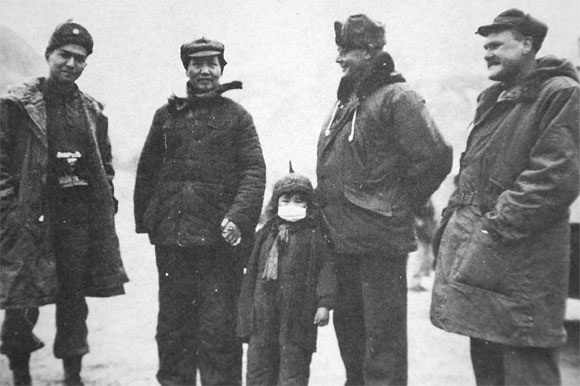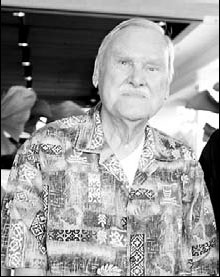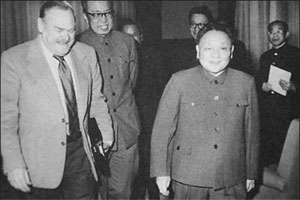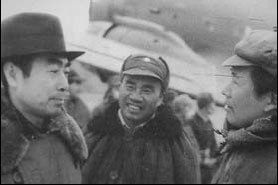Dinner with Mao
|
John Roderick (right) with Mao Zedong (second from left) and his daughter Li Na in Yan'an. Courtesy of John Roderick |
On a winter day in 1945, at age 31, John Roderick - or Lo Teli - as Mao Zedong used to call him, arrived at the headquarters of China's communists in Yan'an, Northwest China's Shaanxi Province.
The newly minted AP correspondent was there to cover negotiations intended to bring the warring Kuomintang and Communist factions together. He was shocked at first by the wrecked small town in western China after the Japanese troops' air raids, but in yaodong, the local caves dwelling, he had a gripping adventure which left a lasting impression on his 39-year-long career as the AP's top China watcher.
Pillows filled with sand and the nearest toilet 30 meters away are just part of his colorful memory of Yan'an. At 93, Roderick does not have a bit of difficulty recalling the stories that came out of his encounters with the most important Chinese leaders at the time.
|
John Roderick File Photo |
In early February 1946, Mao Zedong invited Roderick to eat with him in his modest lodging.
Mao met him at the door of his simple one-story house, Roderick recalls. He described the moonfaced peasant's son as no longer the slender wiry youth of the Long March.
Before dinner, Mao, who had an air of superior self-confidence in Roderick's impression, sat close and carried on a lively conversation through Huang Hua, his official interpreter and later the foreign minister of China.
Mao's padded, worn blue jacket and trousers, and scuffed, loosely tied sneakers, impressed Roderick as much as the succession of delicious dishes.
Roderick did not hide his astonishment because the Kuomintang troops were sieging the communists who could hardly obtain good food and new clothes. Mao told him the fish was from a stream 50 miles away.
"I did not know the communists led such a good life," Roderick said.
"Mr Roderick, I have to tell you, you are our guest," Mao replied. "Of course, we don't eat like this everyday."
Then Mao told him, Chiang Kai-shek (leader of the Kuomintang then) did not deserve trust. "We of course like to cooperate with them," Mao said. "We also appreciate what President Truman has done to prevent the civil war, but we are worrying that will not realize."
The negotiations with Chiang failed at last, but Roderick still met Mao almost daily during his stay in Yan'an. They sat next to each other while watching the Peking Opera, performed in a drafty barn-like building but with all the care and silk costumes the production demanded.
At the same time, Roderick interviewed and updated the lives of a bunch of other Chinese leaders. He described Zhou Enlai, the late premier, as an extraordinary man, very gentle and handsome. Peng Dehuai, the famous general, in his memory was a homely but gentle army commander.
|
John Roderick (left) meets Deng Xiaoping (right) in 1979. Courtesy of John Roderick |
Roderick's last visit of Yan'an was in 1947. At the airport, leaving for the last time, he bumped into Mao and noted it was a bleak day for the revolution he had waged for 26 years. Mao's reply, however, revealed the unflappable, confident leader that he was.
"Lo Teli," he said, using Roderick's Chinese name and looking him in the eyes, "I invite you to visit me in Peking two years from now."
The communists, in fact, moved into the capital city in less than two years, and there, on October 1, 1949, Mao proclaimed the birth of the People's Republic of China.
When he left Yan'an, Roderick tried to pay for his stay, but Mao told him: "I have paid for you." Until today, Roderick still thinks that it was AP who should have paid.
That farewell meeting at the airport was Roderick's last encounter with Mao but not his last reporting on China.
In April 1971, the Chinese government invited an American ping pong team and three American reporters to visit China. Roderick, then AP's chief China watcher in the Tokyo bureau, was one of them. The other two were NBC's John Rich and Jack Reynolds.
The ping pong team was the run-up to Richard Nixon's historic trip to Beijing the following year that led to the unexpected restoration of normal Chinese-American relations.
On April 12, 1971, Zhou Enlai found Roderick among the team in the Great Hall of the People. The premier initiated a handshake, "Mr Roderick, welcome to Beijing. What do you think of here and Yan'an?" Of course they are different, he replied.
In a following speech to the delegates, Zhou talked about the future mutual visits between the media professionals of the two countries. He said: "Mr Roderick, you opened the door."
In 1979, China and America established diplomatic relations. At the same year, Roderick reopened the AP office in Beijing 30 years after it was closed.
It was a regret to Roderick that he did not meet Deng Xiaoping in Yan'an. In 1979, when he became the first chief of AP's Beijing office at 65, he met Deng along with 26 other American reporters.
Roderick talked about his experience in Yan'an and how he witnessed the ping pong diplomatic campaign.
He recalled that there were only three American reporters in the team eight years ago, when Premier Zhou Enlai promised that reporters of the two countries would have more communication. He expressed his appreciation for the change.
|
A photo taken by John Roderick shows, from left, Zhou Enlai, Zhu De and Mao Zedong at Yan'an airport in 1947. |
After the meeting, Roderick wrote a feature story about Deng. He described Deng as a man with great wit. As he pointed out, the photograph of Deng wearing a cowboy hat at a barbeque in Texas in 1979 left many Americans with a favorable impression. More importantly, he wrote, Americans saw humor and wit in Deng, which made them consider him as a man who deserved trust.
In 1980, Roderick had an exclusive two-and-a-half hour interview with Deng. As Roderick recalled, Deng, who was 10 years older than him, was "a very impressive leader, sharp, witty and having a great sense of humor".
Roderick wrote about China again when he was 87, when he learned that Beijing won the bid to host the 2008 Olympic Games. In his story for AP, he recalled that Mao was a sports lover himself, known for his widely reported plunges into the Yangtze River in the 1950s and noted that Deng created a golden age for mass sports in the 1980s and 1990s.
As he illustrated, the women's volleyball team defeated Japan for the first time to win a world championship, then after grabbing five consecutive world titles, won an Olympic gold. Before that, during the Kuomintang's era, China competed in three Olympic Games but never won a medal. Since Deng's day, it has won hundreds. In the 2004 Athens Olympics, China took 23 golds, only three behind the leader, the United States.
"China yearns to collect what no money can buy: the goodwill and esteem of its neighbors and the prestige it enjoyed in ancient days as the illustrious Middle Kingdom," he wrote in the article.
The Chinese version of the article will appear on "International Communications Magazine" soon.
(China Daily 10/18/2007 page20)


















